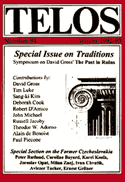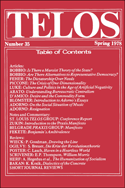 It is hard to imagine what Adorno’s corpus would look like without the deep scars left by his period of exile in the United States during the Second World War. Despite its catastrophic genesis, his exile played a constitutive role in the development of his thought, and made him, among many other things, a savagely insightful commentator on American life. This commentary on America is marked by a dialectic of fascination and disgust with his newfound home, perhaps the most “radically bourgeois country” (75) in the Western world. In particular, he was fascinated by America’s lack of cultural tradition. In his essay “On Tradition,” America serves as a model of a society ravaged by bourgeois rationalization, proudly celebrating its lack of tradition by rejecting “old world” values as archaic, irrational, and pompous. The relatively short history of the nation compounds the problem, further disconnecting us from any substantial sense of tradition or historical consciousness. We are proudly the country of the nouveau riche, possessed of power and wealth bereft of tradition and culture. This literal lack of history and evaluative rejection of tradition places America at ground zero of the crisis of tradition. Tradition survives in America in its most degraded and mutilated forms, manufactured in artificially aged consumer products and conservative “traditional” family values. The recent wave of gauche typographical décor emblazoned with the actual word “TRADITION” seems designed to confirm Adorno’s worst accusations.
It is hard to imagine what Adorno’s corpus would look like without the deep scars left by his period of exile in the United States during the Second World War. Despite its catastrophic genesis, his exile played a constitutive role in the development of his thought, and made him, among many other things, a savagely insightful commentator on American life. This commentary on America is marked by a dialectic of fascination and disgust with his newfound home, perhaps the most “radically bourgeois country” (75) in the Western world. In particular, he was fascinated by America’s lack of cultural tradition. In his essay “On Tradition,” America serves as a model of a society ravaged by bourgeois rationalization, proudly celebrating its lack of tradition by rejecting “old world” values as archaic, irrational, and pompous. The relatively short history of the nation compounds the problem, further disconnecting us from any substantial sense of tradition or historical consciousness. We are proudly the country of the nouveau riche, possessed of power and wealth bereft of tradition and culture. This literal lack of history and evaluative rejection of tradition places America at ground zero of the crisis of tradition. Tradition survives in America in its most degraded and mutilated forms, manufactured in artificially aged consumer products and conservative “traditional” family values. The recent wave of gauche typographical décor emblazoned with the actual word “TRADITION” seems designed to confirm Adorno’s worst accusations.
|
As an occasional feature on TELOSscope, we highlight a past Telos article whose critical insights continue to illuminate our thinking and challenge our assumptions. Today, Aaron Bell looks at Theodor W. Adorno’s “Resignation” from Telos 35 (Spring 1978). |
||||
|
Telos Press Publishing · PO Box 811 · Candor, NY 13743 · Phone: 212-228-6479 Privacy Policy · Data Protection Copyright © 2024 Telos Press Publishing · All Rights Reserved |
||||
 Reading “Resignation” today, it is immediately clear that the historical context is necessary to fully grasp the significance of Adorno’s words. Originally delivered as a radio address in 1968, “Resignation” is, among other things, an important entry in the Marxist theory-praxis debate and a primary document in the history of Adorno’s troubled relationship with the radical student movements of postwar Germany. Adorno, responding directly to the Frankfurt School’s critics of the radical left, defends his refusal to translate Critical Theory into a program for political action. Against the charge of apolitical “resignation,” Adorno articulates a defiant vision of critical thought beholden to no master. This vision of critical thought remains vital today, despite the dated trappings of the theory-praxis debate and the limited interest in Adorno’s biography and the politics of postwar Germany.
Reading “Resignation” today, it is immediately clear that the historical context is necessary to fully grasp the significance of Adorno’s words. Originally delivered as a radio address in 1968, “Resignation” is, among other things, an important entry in the Marxist theory-praxis debate and a primary document in the history of Adorno’s troubled relationship with the radical student movements of postwar Germany. Adorno, responding directly to the Frankfurt School’s critics of the radical left, defends his refusal to translate Critical Theory into a program for political action. Against the charge of apolitical “resignation,” Adorno articulates a defiant vision of critical thought beholden to no master. This vision of critical thought remains vital today, despite the dated trappings of the theory-praxis debate and the limited interest in Adorno’s biography and the politics of postwar Germany. 






